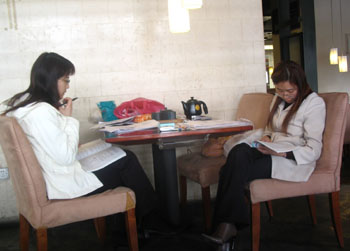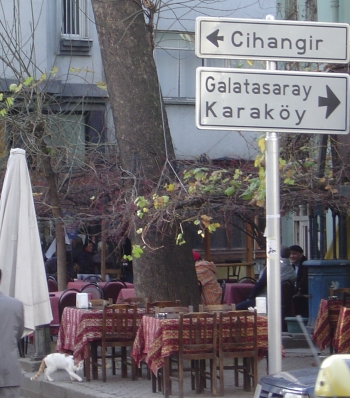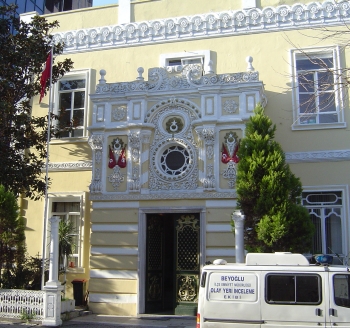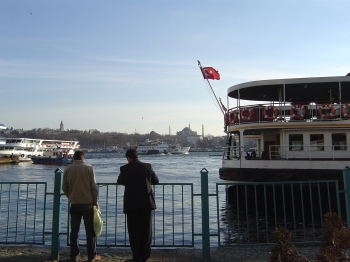We are developing the social individualist meta-context for the future. From the very serious to the extremely frivolous... lets see what is on the mind of the Samizdata people.
Samizdata, derived from Samizdat /n. - a system of clandestine publication of banned literature in the USSR [Russ.,= self-publishing house]
|
An alteration of my domestic arrangements is afoot, and that caused me to have to relocate a bookcase today, so to do this, I had to empty the case of its books. Deep in the depths, I came across a tattered dictionary.
Because I am the sort of idler that will do anything to avoid work, even to the extreme of reading a dictionary, I opened it. In faint pencil, the name ‘Jack Wickstein, Port Augusta, 1928’ was written. It had been my grandfather’s. I wonder if it was a gift. Those were different times when you would give a young man of 20 a dictionary. However because he’d spent much of his childhood interned on the family farm, he never got a complete education, and he was the sort of fellow that never stopped trying to improve himself. So maybe the dictionary was not so illogical a gift after all. In the wake of the Great War, Jack’s Father had issued a family edict that henceforth the family was to avoid looking or sounding German, and an excellent command of the English language was a good way to go about this.
The dictionary itself is rather odd. The first pages are a series of colour plates devoted to underwater sea life. Then a list of worthies who contributed to the articles in the dictionaries. The names mean nothing to me, but the Universities were, and are, the cream of New England learning. I read the Introduction. One passage sprang out at me.
Every word, every term in this Dictionary is standard; that is, classic, or, in other words, adapted for use by the best speakers and writers. None other has been admitted, consequently the work will commend itslef to not only those who want to keep abreast of the times, but to all those who wish to have a thorough working knowledge of the language in which they are constrained to express their thoughts, ideas, and requirements. This is the language spoken today by almost 200,000,000 of the human race. It is believed that it is destined to become the universal language of mankind, as it is spreading to the uttermost corners of the earth, and even supplanting other tongues in their native strongholds.
Thus wrote the editor, Joseph Devlin, in 1925. Eighty years into the future, and his optimism about the future of the English language seems, if anything, to have been restrained. However, it is also a sign of the times that it is rare, if not impossible, to see such rampant optimism about the future in print.
Oh well. Blogging about it will not get the chores done. Back to work I go…
According to this BBC news report, the Labour party spent £ 7,700 on Cherie Blair’s hair during the election campaign. Not my idea of value for money. Sure they won, but still…
I am in a teahouse in the Hongkou district in northeast Shanghai. This is not the most fashionable part of Shanghai, although I get the impression that it was a district in which Chinese artists and writers lived in the 1930s, and (like much of Shanghai) it is full of interesting architecture from that period. And it may be a little like that in character again – it feels like a slightly bohemian, slightly studenty neighbourhood. A new metro line has recently been built through the area, which certainly can boost a neighbourhood.

The teahouse I am in is a branch of a chain named “Chatea”, which seems to build outlets in nice malls, and which appears to cater to an early twenties middle class demographic, and one that is more female than male judging by the customers in this particular branch. They sell a wide variety of traditional Chinese teas, as well as those funny multicoloured bubble tea drinks that are so popular with young people in the Chinosphere. And they have a food menu consisting mostly of Dim Sum. The music in the background is bubblegum music from six or seven years ago, so that would be right for a mid twenties female demographic. (Specifically the are playing the album Shades of Purple by M2M, who are perhaps best known for doing the theme song in the western world for the first Pokemon movie).

It is pleasant, but for me there is one more possibly more important thing, which is there is WiFi. And the attitude to the WiFi is right. The internet access if free, and I was smiled at when I sat down, ordered a pot of tea, and got out my laptop. A couple of minutes later, a waiter came over to me and pointed out the electrical outlet on the wall, next to the table. (Hang on a moment. My shrimp dumplings, turnip cakes and crab dumplings have just arrived).

Okay. I am back. That was not bad at all. Slightly trendier sorts of Dim Sum than one would find in the backstreets of Kowloon, and fancier service and crockery, but definitely good. A couple of rather studious looking girls at the next table did give me one of those “These foreigners are crazy” looks when I started taking photographs of my lunch, but I am used to that. I am going to get revenge. Little to their knowledge, thousands of people on every continent are shortly going to be looking at a picture of them.

I do like the way they have the standard “studying in a coffee shop” look that is instantly familiar, complete with the sprawling papers, and the mobile phones laid out neatly in front of them. Human nature is endearingly familiar, wherever you go.
But anyway, where was I? Oh yes. The free WiFi and the electrical outlet that I was encouraged to use. I left my power adaptor in my hotel, as I was not expecting to find anything this good. The reason why I was not expecting this is that I find it so seldom in London. WiFi in cafes and coffee chains in London is far too often of the “This will cost £7 per hour” variety. A cafe can set up WiFi on this basis if it wants to, but I am simply not going to pay that. However, if you provide me with free WiFi (which will cost you hardly anything) I will buy more coffee and food, possibly more than £7 worth. And then a cafe might provide WiFi, but will not provide an electrical outlet, or (even worse) if it has one conveniently placed they will tell you that you are “stealing electricicy” if you try to use it, or they will put a cap over it to prevent you using it. This isn’t greed, but just stupidity. There is a lack of appreciation as to what customers want and value, and a lack of appreciation of the cost of providing it. (My laptop will run for about four days on 10 pence worth of electricity). And a lack of appreciation about how providing it will create warm and fuzzy feelings about your business.
And if a chain of teahouses in Shanghai can understand this, why can’t a chain of coffee houses in London? Just one. If you figure out what your customers want and give it to them, then you will get repeat business. It is that simple. If I lived in Shanghai (and who knows, someday I might) I would have lunch here all the time. And I will recommend it to my friends. As in fact I just have. Thousands of them.
A waitress keeps coming back to top up my teapot with hot water, too. I clearly could spend all afternoon here. However, there is much more to see, so it is time to post, drink up, and leave.
From Jamie Whyte’s A Load of Blair, a book on the fallacies endemic in political rhetoric that I thoroughly recommend:
In November 2002, an ICM poll asked voters if they were willing to pay more tax to fund increased spending on public services. 62 percent said yes. It also asked respondents if they believed this extra spending would improve standards in health and education. Only 51 percent said yes. At least eleven percent of voters favour pointless increases in taxation.
Nothing says “I love you” quite like saturated fat and slutty lingerie.
I get the impression that somewhere in France, a middle finger is being raised.
Update: It has been suggested that this be printed on a tee-shirt with the following caption…

My Imam went to Mecca and all he got me was this lousy Tee-shirt Sorry, I just had to share that 
I spotted this online quiz on a Tim Blair thread. Normally, such quizzes tend to be inordinately tedious, but this one raised a chuckle. It features a series of quotes taken from both Al Gore’s book Earth In The Balance and The Unabomber’s Manifesto. Get marks by correctly attributing each quote to either Unabomber or Gore. I scored precisely 50%. Heh.
As an antidote to environmental luddites, used copies of Bjorn Lomborg’s fantastic book The Skeptical Environmentalist are going for a song over at Amazon. When I bought this book a few years ago, it cost me more than fifty (Australian) dollars. If you have not yet read this fascinating expose of the Green movement, what are you waiting for? Whip that credit card out now!
What psychotherapists call a moment of insight. Probably nonsense, therefore, but let us follow the thought.
New Labourites are uniformly middle-class kids brought up in the arid pinched north of England and Scotland in the 60s and 70s. They have been on family holidays to France a whole lot and idealise the place. Naturally. There is a lot to like, and as well-off tourists, the likeable bits are the things they have seen.
Thus, and because they attribute all social good to government, it is a conclusive argument in the New Labour mind that French dirigiste, technocratic ways of government are to be emulated. Technocracy, because they do not understand it , (having studied arts and social sciences not Bac-C) is modern. French is modern. But the actual content or history – history is not interesting if you are modern – of French institutions need not be studied. We know all about them: we have been there on holiday 1.
Thus ‘identity cards’ are modern and harmless, though ours will not work as simply as the French and there is plenty of evidence they are a nuisance to them.
Arbitrary powers of detention are fine, because France has them, and French judges (conveniently ignoring the fact that they are closer to the state than our chief constables, and the ones exercising such powers) can be found in favour.
And now the reductio ad absurdam: French local government is modern. That is, the commune system introduced at the turn of the 18th and 19th centuries is. Maybe local government reorganisations in England (1540s, 1880s, 1965, 1974, 1986, 1995-98) will stop for 200 years when we are truly modern.
1= Not me, you understand. I do not come from the sort of family that had foreign holidays. Though to pre-empt accusations of negative stereotyping of North Britain, I should point out I was brought up in Yorkshire between 1966 and 1974, and what holidays there were were further north.
There is an e-mail program called Goowy which is one of a species of software I call ‘landmine-ware’, which is to say during the sign up process, on one of those bits no one actually reads, there is a yes-by-default opt-in box that allows the software to do something very few people would agree to if they actually noticed what they were being asked to agree to.
A friend of mine just signed up for Goowy and as a result Goowy just imported her entire contacts list from Gmail and spammed them all (including me) with invitations to sign up for Goowy. Now as this was technically permitted by the default-yes selected check box, there is nothing clearly actionable about this. However as no one would usually agree to their entire email address book being spammed by a third party, it would be fair to say Goowy counts on people just not realising what they are ‘consenting’ to and thus relying on people’s natural tendency to not carefully watch every step they take (hence my description of Goowy as ‘landmineware’)
Now just to spare all the obsessive libertarians reading this from getting their knickers in a contractarian twist, just because something may not be immoral theft (i.e. Goowy did not ‘steal’ permission to spam in your name) it does not mean it should be socially respectable to trick people into doing something either. Yes, ideally we should all read every line of the disclaimer on every single thing we sign up for on the internet. Yet other than a few obsessives, no one actually does that in the real world as there is a general expectation that nowadays companies understand how much spammers are hated and what bad PR can be generated by acting like a spammer. Sadly Goovy suggests that this expectation is not quite as dependable as it should be.
At the very least, tricking people into in effect becoming spammers gets people like me writing nasty things about any company who would do that. In short, any company who resorts to abusing what is typical customer behaviour should not be trusted. Even if tomorrow Goowy announced it was going to make that option default-no rather than default-yes (i.e. permission to spam your entire address book of contacts), I would not allow them to be anywhere near my personal email and I suggest you do not either.
It has always puzzled me why the state pays ‘compensation’ to victims of certain crimes. Why are fellow taxpayers robbed to compensate an individual for a misfortune? Surely that is a job for an insurance policy.
There are now calls for victims of international terrorism to be financially compensated and again, I cannot quite figure why the general public should be required to stump up for this. Whilst ‘acts of war’ and terrorism are often specifically excluded from insurance policies, it is possible to find policies which include even that if you are willing to pay premiums. It just seems odd to me that folks should have any expectation of a non-charitable, non-insured payment from fellow national subjects.
A few more pictures from grimy, chaotic, interesting Istanbul…

Turkey… NATO member and on the frontline of the struggle for secularism

Hagia Sophia, now a museum, is a fitting place to ponder the fact civilisations and not just nations sometimes disappear



Perhaps the coolest place in Istanbul is a cistern, built by Justinian! It is unknown why the two statues of medusa are sideways and upside-down


The bazaars and streets are insanely busy and…

… you see the strangest things!
I must say I find the place fascinating, though my travelling companion might use rather different words.
I am out of London for a few days, taking in the sights, sounds and tastes of Istanbul.

They know a thing or two about footie in these parts

Almost every turn brings an interesting skyline

It would appear the gun laws are far less benighted than in poor defenceless Britain

The skylines are really amazing (click for larger image)

Rather cool Turkish police station… no doubt best seen from the outside

I had not realised how dramatic the Bosphorus is… a tremendously busy sea-lane running right through the centre of a large city is quite something to behold

The sense that the city revolves around the sea is everywhere. There are so many rod fishermen that my fanciful head started having images of ancient phalanxes (click for larger image)

And just to ensure no one thinks this report from Istanbul is being posted by an impostor… yes, the city is well stocked with rather fine ladies My first impressions of Istanbul are that it is dirty, chaotic, its traffic verges on homicidal, the food is great, people seem helpful and friendly. In short, simply splendid!
|
Who Are We? The Samizdata people are a bunch of sinister and heavily armed globalist illuminati who seek to infect the entire world with the values of personal liberty and several property. Amongst our many crimes is a sense of humour and the intermittent use of British spelling.
We are also a varied group made up of social individualists, classical liberals, whigs, libertarians, extropians, futurists, ‘Porcupines’, Karl Popper fetishists, recovering neo-conservatives, crazed Ayn Rand worshipers, over-caffeinated Virginia Postrel devotees, witty Frédéric Bastiat wannabes, cypherpunks, minarchists, kritarchists and wild-eyed anarcho-capitalists from Britain, North America, Australia and Europe.
|
























